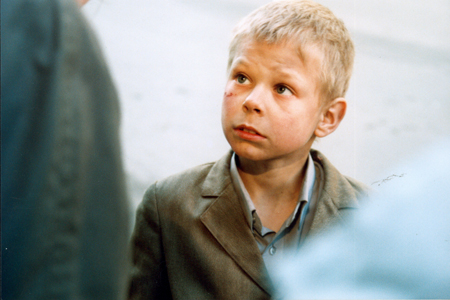FILM-FORWARD.COMReviews of Recent Independent, Foreign, & Documentary Films in Theaters and DVD/Home Video
Directed by: Andrei Kravchuk. Produced by: Vladimir Husid & Vladimir Bogoyavlensky. Written by: Andrei Romanov. Director of Photography: Alexander Burov. Edited by: Tamara Lipartiya. Music by: Alexander Kneiffel. Released by: Sony Pictures Classics. Language: Russian with English subtitles. Country of Origin: Russia. 99 Minutes. Rated PG-13. With: Kolya Spiridinov, Denis Moiseenko, Maria Kuznetsova, Polina Vorobjeva, Olga Shuvalova & Nikolai Reutov. With international adoptions in the news, The Italian poignantly brings situations seemingly out of a Dickens’ novel into the 21st century. Andrei Romanov’s screenplay was inspired by a newspaper article and the insights gleaned from a disgruntled adoption broker. Madam (played by Maria Kuznetsova) serves as the film’s entrée into corrupt adoptions that manipulate both prospective parents from the wealthy west and warehoused children. Filmed at a provincial institution near Russia’s snowy border with Finland and with resident children from this orphanage as the many extras, Madam and the drunken headmaster set up a little Potemkin village of legality for adopting parents. When an Italian couple selects cherubic blond six-year-old Vanya (Kolya Spiridonov), the other kids teasingly nickname him “The Italian.” But before the lengthy paperwork has barely started, and all the palms greased, the “one in a million” happens – a real mother shows up demanding her child. She is quickly kicked out by the headmaster because her son is gone. Windows full of mesmerized children watch her leave. The camera very slowly and powerfully scans them, a repeated technique by cinematographer Alexander Burov, who goes beyond the moodiness he established in Father and Son with almost every scene enshrouded in fog. The orphanage is really run by a teenage inmate, Kolyan (Denis Moiseenko), a hunky Fagin on a motorbike. Crossing Lord of the Flies with Communism, he collects all the tips and earnings of the children he sends out to commit thievery, odd jobs and prostitution, then doles out shares for their clothes and treats. He also beats Vanya for holding back a generous tip. He knows that the real threat to his power over his illiterate serfs is hope, as he complains that “Everybody went crazy” at the sight of the mother, which has inspired Vanya. Like Oliver Twist, Vanya makes a gutsy request, but one that is even more heretical than more gruel – for information on his mother. He even persists in learning to read just so he can decode the hidden key to his past and future – his personal file. His persistence inspires Irka (Olga Shuvalova) to rebel against Kolyan’s pimping and help the boy, like Dickens’ Nancy. She weaves him into her own fantasy of family, justifying stealing from Kolyan. Fleeing on his own, Vanya sets out on a quest on trains, buses, streets and alleys that seems as scary as anything Odysseus faced, all while clinging to his battered copy of Kipling’s Mowgli stories. Director Andrei Kravchuk, in his feature film debut, recalls classics of orphans desperately seeking their mothers, such as Fred Zinnemann’s post war The Search and Phillip Noyce’s Rabbit-Proof Fence, complete with a menacing villain following closely behind, Madam and her bodyguard. Young Spiridonov’s convincing performance makes Vanya’s quick-witted cleverness sympathetically credible from a child’s point of view.
The action takes place through a Russia strewn with drunks and broken bottles. Unemployed young people seem to have nothing else to do but drink and procreate, as a more kindly and sober headmaster sadly
notes his orphanage is getting more and more newborns because “women refuse to be mothers,” even as he decries baby selling. Alexander Kneiffel’s
quiet score is centered on a moving piano leitmotif when the snow falls to cover up the heartbreak. However, the abruptly optimistic ending is difficult to absorb.
Nora Lee Mandel
|
